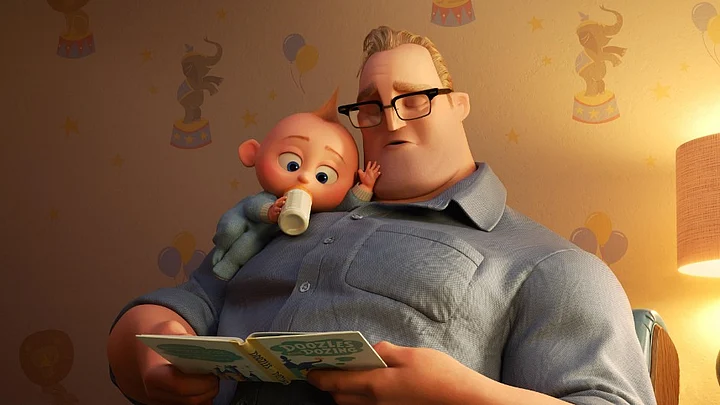Incredibles 2 begins exactly where the first one left us at as if the plot and characters were merely paused. The Parr family is battling Underminer who as we remember popped up with a whirring giant drill. The result is a set-piece in which action is so clear-eyed you wonder whether you’ve been watching foggy stuff in superhero universe all along.
Superhero movies are a product of green screens and tech wizardry, and more often than not, the action they produce tends to confuse our eyes than court them with clarity. In the much-awaited sequel to this superpowered family however, writer-director Brad Bird again illustrates how action can be kinetic and fluid despite multiple characters.
The set-pieces have become grander, the chaos manifold, but the precision, oh my dear god, is so beautiful and lively. This is refining action to its very rhythmical, raw-boned essence.
Perhaps memory has tricked us, but Bird’s original during its release was nothing short of ground-breaking, and it wasn’t only because of its action. Yes, we had a few superheroes movies back in 2004, but none had the self-aware intelligibility, the irreverence that went on to make Marvel Cinematic Universe a thumper jumper later. The great joy of Bird’s sequel to his incredible flourish in superherodom is that one discovers the same witty energy we had witnessed 14 years ago. Despite the omnipresent cheeky heroes of our times, the Parr family still has it in them to make us laugh, and continues to dazzle us with their outsized actions.
The world as we know it, still considers superheroes illegal. So despite city-saving attempts, our heroes have been relocated to a motel. A billionaire Winston Deavor (Bob Odenkirk) and his inventor sister, Evelyn (Catherine Keener), come to their rescue and plan to make our superheroes legal. The proposed idea is that superheroes must carry cameras in their suits so that the public are first-hand witnesses to their action and struggle and this they hope will pressurise legalisation.
To Bob’s (Craig T Nelson) disappointment, Helen (Holly Hunter) gets chosen for the role because Elastigirl holds a record of lesser collateral damage than Mr. Incredible. The film settles into a sitcom set-up: mom goes to work, and dad stays home. Elastigirl stops a monorail from crashing, saves a politician from certain death, and has to battle a bigger villain, but Bob staying at home has to deal with his teen daughter Violet’s (Sarah Vowell) boy problems, solve new math for over-speeding Dash (Huck Milner), and above all, confront the non-stop powers of their youngest, Jack-Jack (Eli Fucile). Fine, Elastigirl is on her adventure outside but the film tells us parenting is no less with daily wonders at home.
Jack-Jack steals all the thunder in the film, inducing laughter so unbridled and pure that you keep looking for what surprises he’s going to spring. The last film showed us how the little fellow took on his abductor, and here, he gives a tough time to his father with his endless powers.
He can turn into a troll, a fireball, move through different dimensions, turn into a giant, his eyes can fire laser beams, and he can even multiply into several Jack-Jacks. In Jack-Jack, Bird finds the most genius way of startling our funny bones. Provoked by a raccoon or adored by Edna Mode (voiced by Brad Bird), Jack-Jack is what we need to drive away the blues. This superbaby is destined to be a cult, and very justifiably, wonderfully so.
Pixar knows parenting better than any studio, and the skill here is on terrific display with internal family dynamics that exude warmth and humour in equal measure. There’s of course a villain hovering in the narrative, a villain named Screenslaver who is of the opinion that people prefer superheroes because they don’t want to do the hard work. A cheeky commentary on our times, and a pertinent argument.
The inherent politics of Brad Bird’s film are still problematic, deriving their strength from Ayn Rand’s philosophy to Shakespeare’s Coriolanus. In the clash of ‘born’ versus ‘made’, the film still favours the former, giving us an American version of casteism.
As the filmography of Bird (Ratatouille, Tomorrowland) proposes a continuous conundrum: do his characters wish to dominate over mediocrity or do they just want their own space to operate? We’re yet to come to a conclusion, but as of now, he seems to be an objectivist.
The misguided politics can be ignored since what we have before our eyes is animation that is as incredible as it can get. There’s also Michael Giacchino’s score, wooing scenes after scenes with an ambling arcade of sounds. And you have the terrific voice cast, breathing life into computerized figures: Craig T. Nelson still sighs when Bob can’t fight his family, Holly Hunter still carries that delicious drawl of Helen, Sarah Vowell understands the teenage issues of Violet like a pro, Dash’s new voice by Huck Milner gives his energy a reason to rejoice, and Eli Fucile’s voicework makes you want to take little Jack-Jack in your lap and cuddle him.
By the end of it all, you’ll be thrilled by the two-threaded narrative that culminates into a big bluster of a climax that knows how to have fun with action while offering exhilaration in surplus amounts. And you’ve laughed so much along the way. This sequel may not have the visual shock of the original, but it has enough invention and originality in it to convince us that it is as good as the first one.
(The writer is a journalist, a screenwriter, and a content developer who believes in the insanity of words, in print or otherwise. He tweets @RanjibMazumder).
(At The Quint, we question everything. Play an active role in shaping our journalism by becoming a member today.)
